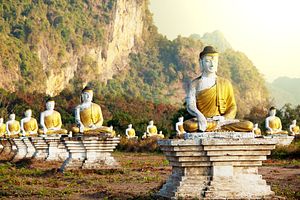One New Zealander and two Burmese have been jailed for two years for disrespecting religion in Myanmar after their photoshopped picture of Buddha wearing sunglasses drew anger. However Buddha is used to sell much both in the West and across Southeast Asia.
New Zealand publican Phil Blackwood was sentenced on March 17 to two years imprisonment in Myanmar for offending religion after a well publicized case. Two local colleagues, Tun Thurein and Htut Ko Ko Lwin, were sentenced with him. Thurein owns the bar, which the other two managed. How did they insult religion? By distributing a picture advertising the bar the V Gastro Bar which showed Buddha wearing headphones. Blackwood is appealing.
The men were arrested last year after members of the Association for the Protection of Race and Religion, which newspaper the Irrawaddy calls a Buddhist nationalist movement, complained to authorities. The men quickly apologized via a note, and sought to correct their ignorance, which they said was “embarrassing,” finishing with, “We thank the citizens of Yangon for their patience and kindness and sincerely hope that our apology will be accepted.” Throughout the case the defendants pleaded not guilty. A police chief said that “Mr. Phillip” posted the picture “because using the Buddha in ads is in fashion internationally and thought it would attract more attention.”
Amnesty International said it was a “chilling indication of religious intolerance in the country.” The case has inflamed passions in Myanmar, a deeply religious nation. Buddhist nationalists have become more hardline in recent years. Non-Buddhists and Muslims, the Rohingya in particular, have become targets. Hate speech, according to Amnesty, is on the increase and a Burmese writer Htit Lin Oo is currently on trial for insulting religion when he criticized the use of Buddha as a tool for discrimination.
The New Zealand Herald quoted Massey University Professor Peter Lineham as saying that Kiwis needed to be more understanding of others’ religions and that not everything is there to be laughed at. He also suggested that there were “about 20 countries” from Islamic to Orthodox or Catholic that would similarly punish anyone insulting their religion. Though in comparison Vatican City was surprisingly tolerant when it arrested then ejected British metal band Cradle of Filth for their “I Love Satan” t-shirts in 1998.
But religious intolerance is more often seen as the preserve of hardline Christians or Islamist extremists. Buddhists are often perceived to be so “chilled out” by many travellers and Westerners that notions of genuine offense seem inimical. Whilst scanty clothes in temples or tattoos of Buddha have long upset locals in Southeast Asia and every good travel guide warns against such things, notions of everyday offense to religion can be harder to drive home. Laos’ Buddhism, for example, is often linked to the relaxed nature of its people by optimistic travel writers. Possibly this goes part way to understanding backpackers’ ridiculous behavior at times in towns such as Vang Vieng.
As Global Post journalist Patrick Winn, who covers Southeast Asia, pointed out in early March the religion “is often disrespected in an offhand way… Buddha statues are used to decorate clubs packed with sweaty, wasted partygoers.”
Buddha advertises plenty across the region. Bars with the deity’s name in the title or in other references are not uncommon. In Vietnam, there is a “Buddha Bar” in Saigon in the upmarket An Phu suburb and there was for years a “Funky Buddha” in Hanoi. The latter, a lounge bar with thumping techno, was especially popular with young locals and the odd aspirant DJ. However the owners were forced to change the name to “Funky B” after protests from a local Buddhist group. But, as is the case with Mr. Blackwood, these are establishments owned by locals. This might be part of the difficulty in eradicating such casual religious disrespect: Those cashing in are not always ignorant foreigners but are happy to exploit their ignorance for financial gain. How is a beer-addled backpacker supposed to know where to draw the line?
Helen Clark was based in Hanoi for six years as a reporter and magazine editor. She has written for two dozen publications including The Diplomat (as Bridget O’Flaherty), Time, The Economist, the Asia Times Online and the Australian Associated Press.

































